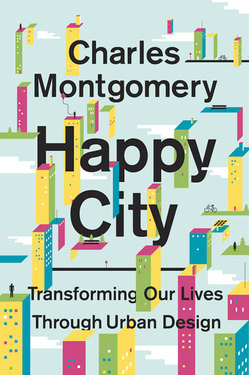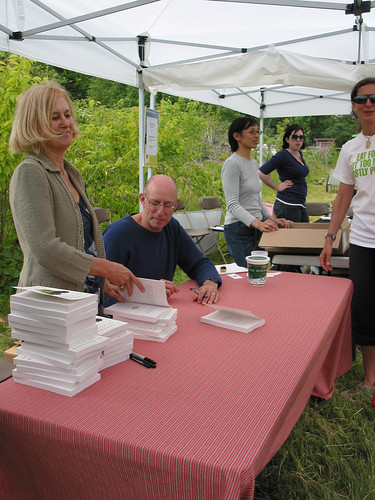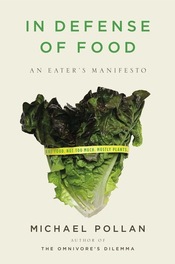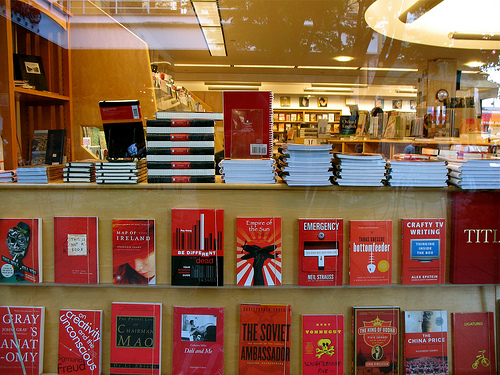
I felt sad when I finished reading “Happy City” the other day. Vancouver author Charles Montgomery weaves together stories, interviews, culture and information in such a compelling way that I felt like a month-long conversation had ended. When I began reading it, I gushed about it on Facebook and with good reason. It has something for any city dweller — from the history and science of happiness and behaviour, to impacts of transportation on wellbeing, to dwelling types influencing social interaction. I returned it to the library reluctantly after my initial 14-day restricted loan period was up, and waited anxiously to get it back until another copy was returned six days late. (I guess the other person liked it even more than I did.) I felt its absence like a close friend.
Continue reading What makes a Happy City? »
The colour-themed window display changed from blue to a startling black. This was no longer the time for a cheery yellow, or a come hither violet which announced itself in beautifully intricate illustrations. No, it was a display that suggested mourning: Kitsilano’s Duthie Books is closing at the end of February.
It is my daily dose of design inspiration on my way to work. The highlight of my short walk after a long bus ride. The surprise, the freshness — what will they think up next? or ooh, they are incredibly clever/thoughtful/creative! and gosh, that must be fun! (Perhaps I’ll take a page from their book — no pun intended — and rearrange my own every so often. But I will need more first.) I have enjoyed it day after day for over a year. I have even sometimes wondered if others watch me staring at the covers intently and ask themselves what could be so fascinating. And, as if they knew who was walking by twice a day, the staff put up design books one week and I felt giddy. I cannot think of anywhere else that has helped me discover so many interesting book covers — and potential reads. Design love aside, however, the rotating display is a highlight for many of my colleagues who are as heartbroken as I am to see it go.
Continue reading Duthie Books closing after 53 years »

With lucky last-minute tickets, I attended an engaging talk by author Michael Pollan (The Omnivore’s Dilemma) at Vancouver’s spectacular UBC Farm this afternoon. This was his only Canadian stop on a book tour for the paperback edition of In Defense of Food: An Eater’s Manifesto (reviewed here earlier this week) and the location could not have been more appropriate. The afternoon included a quick farm tour after the talk, upon which I’ll touch later. It was cloudy for the talk, quite gladly, then the sun showed up afterward and made the place look like paradise! I enjoyed eating a yummy home-made salad and watching others eat around me. The event sold out all 670 tickets, and each person received a signed copy of the book.

Continue reading Michael Pollan at UBC Farm »
 If that title seems confusing at first, the sentiment simply represents the chaotic experience of the modern North American in deciding what to eat.
If that title seems confusing at first, the sentiment simply represents the chaotic experience of the modern North American in deciding what to eat.
With thousands of choices at the supermarket, diet advice that changes every year, and a regular barrage of the “latest studies” that turn previous ones on their heads, it’s no wonder we’re looking for simple solutions. From fad diets to the latest incarnation of margarine (50% lower in calories!), what to eat and how much is often up to the discretion of our sources — the most prominent of which have other motives besides your health in mind. And even if you think you know what to eat and are feeling pretty healthy, chances are you can still do better. Michael Pollan, recognising this conundrum, offers seven words that will change your life in the most literal sense: “Eat food. Not too much. Mostly plants.”
In the first two of three parts of his fifth book, In Defense of Food: An Eater’s Manifesto (2008), Pollan illustrates in depth the problems with our food (in the broadest sense possible) and how it is we arrived here. The history is fascinating, and it is that which helps the reader understand why and how we got here, who the key players are and, ultimately, how to go about fixing it. As it turns out, the history goes back a long way.
Continue reading “You are what what you eat eats too” »





